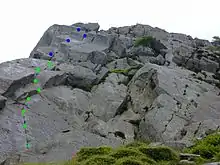buttress
English
WOTD – 18 November 2009

Buttress tree roots (Kapok tree)
Etymology
From Old French ars bouterez (noun, literally “supporting arcs”), from bouterez (adj), oblique plural of bouteret (rare in the singular), from Frankish *botan, from Proto-Germanic *bautaną (“to push”). Ultimately cognate with beat.
Noun
buttress (plural buttresses)
- (architecture) A brick or stone structure built against another structure to support it.
- Anything that serves to support something; a prop.
- (botany) A buttress-root.
- (climbing) A feature jutting prominently out from a mountain or rock; a crag, a bluff.
- Crowell Buttresses, Dismal Buttress, Hourglass Buttress, Kardam Buttress, Seven Buttresses
 Milestone Buttress on Tryfan. The direct route is highlighted.
Milestone Buttress on Tryfan. The direct route is highlighted.
- 2005, Will Cook, Until Darkness Disappears, page 54:
- All that day they rode into broken land. The prairie with its grass and rolling hills was behind them, and they entered a sparse, dry, rocky country, full of draws and short cañons and ominous buttresses.
- 2010, Tony Howard, Treks and Climbs in Wadi Rum, Jordan, →ISBN, page 84:
- Two short pitches up a chimney-crack are followed by a traverse right to the centre of the buttress.
- Crowell Buttresses, Dismal Buttress, Hourglass Buttress, Kardam Buttress, Seven Buttresses
- (figuratively) Anything that supports or strengthens.
- South
- the ground pillar and buttress of the good old cause of nonconformity
- South
Synonyms
Derived terms
Translations
brick or stone structure built against another structure to support it
|
|
anything that serves to support something
|
|
Verb
buttress (third-person singular simple present buttresses, present participle buttressing, simple past and past participle buttressed)
- To support something physically with, or as if with, a prop or buttress.
- To support something or someone by supplying evidence; to corroborate or substantiate.
Translations
support something physically with, or as if with, a buttress
support something or someone by supplying evidence
|
|
Anagrams
This article is issued from Wiktionary. The text is licensed under Creative Commons - Attribution - Sharealike. Additional terms may apply for the media files.